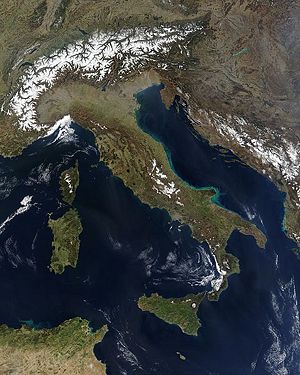Italus
Italus or Italos was a leader, according to the Aeneid by Virgil who was an early inhabitant of Italy. There is a possibility that the name Italy is derived from Italus. He was king of the Sicels or Oenotrians who were early inhabitants of Italy.
Several accounts suggest this, although there were no accurate historical records confirming this. In a work called Fabularum Liber or Fabulae the writer Gaius Julius Hyginus recorded the myth that Italus was a son of Penelope and Telegonus. The Greek historian Thucydides in his History of the Peloponnesian War, suggests that the Roman province of Italia got its name from Italus. Thucydides wrote: "Even at the present day there are still Sicels in Italy; and the country got its name of Italy from Italus, a king of the Sicels, so called. (6.2.4)". The Greek historian Dionysius of Halicarnassus in Rhomaike Archaiologia or Antiquitates romanae, "Roman Antiquities"), quoting Antioch of Syracuse, retells this account that Italia was named after Italus (1.35), and alongside this Dionysius retells the other account that Italia derives its name from a word for bull calf (1.35), an etymology also stated in Timaeus, Varro (Rerum Rusticarum, 2.5), and Festus. The poet Virgil writing around the time of Emperor Augustus Caesar suggested that Italy was named after the leader Italus.[1]
References
- ↑ Virgil; translater: Rolfe Humphries. "The Aeneid", The Scribner Library, 2010-04-03. Retrieved on 2010-04-03. “... There is a land in the West, called by the Greeks, Hesperia; anciency and might in arms and wealth enrich its soil. The Oenotrians lived there once; now, rumor has it, a younger race has called it Italy after the name of a leader, Italus...”
